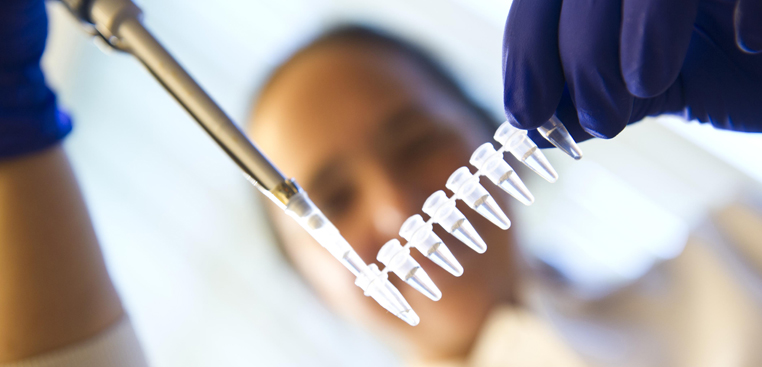Research

Our Programs
The department’s faculty members work together to shape our future as stem cell biology moves from discoveries to new therapies and cures.
Michael Bonaguidi, PhD, is tapping into the potential of neural stem cells within the adult brain. These stem cells can generate more stem cells or form new neurons and supporting cells, offering a possible avenue for treating symptoms associated with Alzheimer’s disease and other brain dysfunctions. (bonaguidilab.usc.edu)
Paula Cannon, PhD, and her collaborators are genetically modifying blood-forming stem cells to cure HIV/AIDS. Along with principal investigators (PI) John Zaia and David DiGiusto, from the Beckman Research Institute of City of Hope and Sangamo Biosciences, Cannon is a co-PI on a $14.6 million CIRM grant that is funding this research. The approach is inspired by the “Berlin patient,” a man cured of both HIV and leukemia through a bone marrow transplant from a donor with a gene mutation that confers natural immunity to HIV. In collaboration with Sangamo BioSciences, Zaia is the PI on an additional $5.6 CIRM strategic partnership grant for the ongoing clinical trial portion of the project. (uscmmi.com/paulacannonlab)
Gage Crump, PhD, is using zebrafish to understand the genetics and cell biology of how the face is patterned during development, as well as how skeletal tissues can be rebuilt following severe injuries. His findings are helping to explain a variety of human craniofacial birth defects and providing novel insights into how to better stimulate bone repair in patients. (crumplab.usc.edu)
Denis Evseenko, MD, PhD, investigates the potential of human pluripotent stem cells (hPSC) to grow, repair and replace cartilage. By identifying and characterizing the formation of hPSC in early human development, he and his colleagues hope to overcome the significant obstacles inhibiting the ability to generate new tissue for transplantation and illuminate the way for potential new treatments, including alternatives to joint replacement. (evseenkolab.usc.edu)
Scott E. Fraser, PhD, has a long-standing interest in the imaging and molecular analysis of intact biological systems, and has been developing new technologies for novel assays. His current research centers on the high-resolution imaging of embryonic zebrafish and analysis of craniofacial development in avians and mice. He conducts this research at four shared imaging facilities: the Translational Imaging Center (TIC), the Center for Electron Microscopy and Microanalysis (CEMMA), the Translational Biomedical Imaging Laboratory (TBIL), and the MRI Center. (fraserlab.usc.edu)
Amy Firth, PhD, uses induced pluripotent stem cells (iPSCs) generated from skin biopsies to study human lung diseases, such as asthma, chronic obstructive pulmonary disease, cystic fibrosis and idiopathic pulmonary fibrosis. She combines gene editing, iPSC technologies and directed differentiation: to generate reproducible models of respiratory diseases in a dish; to generate chimeric animal models to understand disease development and progression; and to utilize these models in high-throughput screening. (firthlab.usc.edu)
Senta Georgia, PhD, from the Department of Stem Cell Biology and Regenerative Medicine and Saban Research Institute of Children’s Hospital Los Angeles is working to induce intestinal stem cells to make insulin by “turning on” key genes. The goal is to use these insulin-producing intestinal cells to treat diabetes. (georgialab.usc.edu)
Justin Ichida, PhD, is seeking treatments for amyotrophic lateral sclerosis (ALS), or Lou Gehrig’s disease, by studying neurons formed by reprogramming skin cells from patients with ALS. These patient-derived neurons display the disease’s signature degeneration. The Ichida laboratory has used them to identify several FDA-approved drugs that keep the neurons alive in the Petri dishes — and might do the same in patients. (ichidalab.usc.edu)
Wange Lu, PhD, is studying neural stem cell self-renewal and differentiation, pluripotency and somatic cell reprogramming. (wangelulab.usc.edu)
Rong Lu, PhD, is “barcoding” individual blood stem cells by labeling them with a genetic marker. This allows her to observe individual cells’ contributions to forming blood, which could determine strategies for more effective blood transfusions or bone marrow transplants. (ronglulab.usc.edu)
Megan McCain, PhD, is pioneering “Organs on a Chip.” To overcome the limitations of using laboratory animals or human cells in Petri dishes to study human diseases, McCain’s laboratory engineers micro-scale mimics of human tissues. (livingsystemsengineering.usc.edu)
Andrew P. McMahon, PhD, FRS, department chair, is exploring the regulatory processes that construct, maintain and repair mammalian organ systems with a principal focus on the central nervous system, skeleton and kidney. (mcmahonlab.usc.edu)
Joseph T. Rodgers, PhD, focuses on uncovering the signals and communication networks that instruct stem cells to coordinate and effectively work together to grow and repair organs and tissues, including muscle, skin and bone. (rodgerslab.usc.edu)
Neil Segil, PhD, aims to treat deafness through the regeneration of the sensory cells of the inner ear. His current research is focused on inner ear development, hair cell regeneration, and the causes of sensitivity to noise, certain antibiotics and chemotherapy agents. (segillab.usc.edu)
Henry Sucov, PhD, is researching the cellular and molecular basis of cardiovascular development and the etiology of congenital cardiovascular defects, and addressing how these insights can be extended to regenerative therapies for adult heart disease. (sucovlab.usc.edu)
Qi-Long Ying, PhD, is focusing on understanding how embryonic stem cells decide whether to self-renew or to differentiate. (yinglab.usc.edu)
Min Yu, MD, PhD, recently isolated breast cancer cells circulating through patients’ blood streams and kept these cells alive in Petri dishes. She is using these cells to identify mutated cancer genes and the right drugs to target them — ushering in personalized treatments for breast cancer patients. (yulab.usc.edu)
